Items
Contributor is exactly
Alisha Downs
-
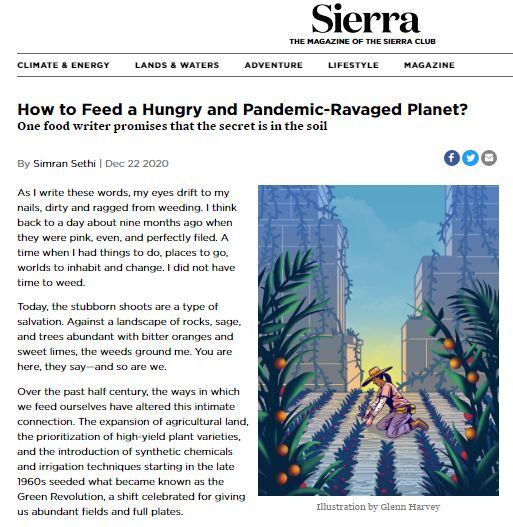 2021-04-18
2021-04-18Gardening: Feeding the Planet and Ourselves
Gardening is something I learned I loved in the spring of 2019, and I noticed many differences during the pandemic. The garden centers were always busy, much busier than the year before. And often, they would be sold out of things such as vegetables. The article I have shared here I found while researching food insecurity. I have long thought that growing your own food is something that should be more widespread, especially among places of poverty. Of course, this article does not mention the fact that people living in extreme poverty barely have enough water to survive, let alone grow crops with. Regardless, this article makes good points about our soil, our diets, and the future of our planet and species. I think one good consequence of the pandemic is more people will turn to gardening, which opens up many more aspects of life. -
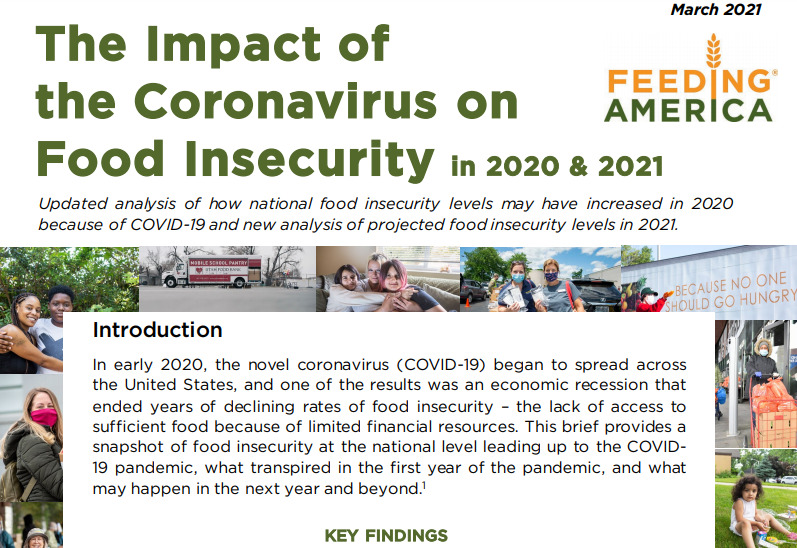 2021-04-18
2021-04-18Feeding America in a Pandemic
Feeding America released briefs in March of 2020, one for food insecurity locally and one nationally due to the pandemic. I have attached the national brief. This is relevant to my research on the consequences of the pandemic. The briefing looks back to 2019 and 2020 and compares notes on food insecurities. Feeding America reviews this and discusses the future of food insecurities. It also talks about how race effects food insecurity, which is something that needs to be talked about. -
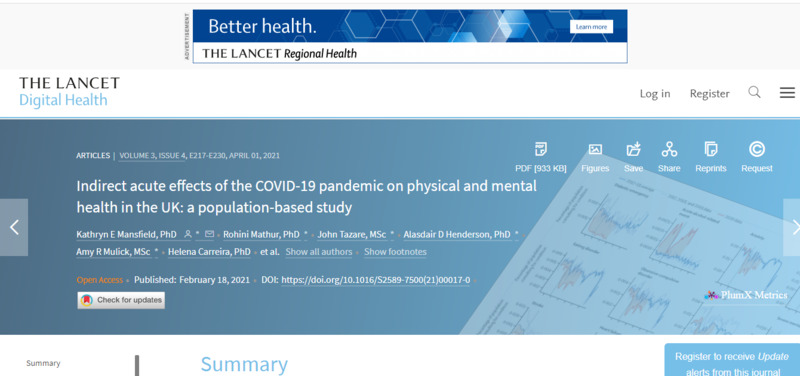 2021-04-11
2021-04-11Indirect acute effects on physical and mental health
This academic article is in the Lancet, a medical journal. I chose this because it is public, unlike some academic articles, and it is, as of right now, a pretty unique research article. Although it is done in the UK, it reviewed medical records, both physical and mental, from 2017 to 2020. The changes are a little surprising, as the largest reductions in health care at the start of the restrictions were diabetic emergencies, depression, and self-harm. This is something I have seen a lot in my research into the unintended consequences of the COVID-19 pandemic. Mental illness is the last thing to be cared for in a pandemic, or even in other natural disasters. The consequences on human health from this pandemic are only just now coming to light. This journal entry covers in-depth research and I highly suggest it. -
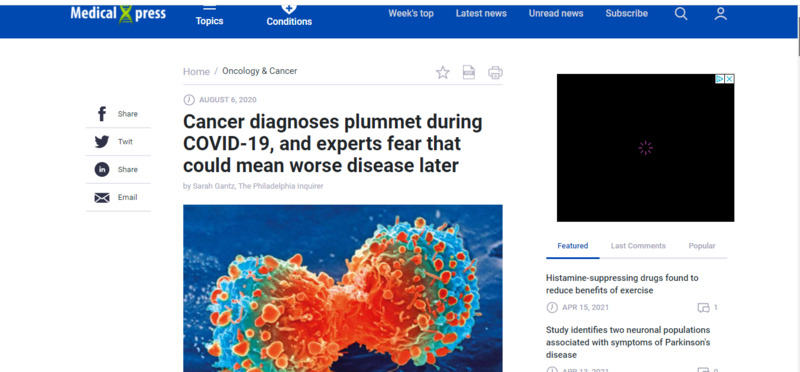 2021-04-11
2021-04-11Cancer diagnosis rates go down!
I know I have presented a pretty eye catching and exciting title, but the fact of the matter is, they aren't going down. The amount of people who have cancer has not plummeted, as the title suggests. Rather, the statistics have gone down. As the article states, "new findings offer grim evidence of the consequences of delayed care: A rise in undetected cancers that, when eventually diagnosed, may be more advanced and difficult to treat." I think this is a great reminder that statistics are not the people they represent, and many things effect the numbers. This is relevant to my research on the unintended consequences of the COVID-19 pandemic. -
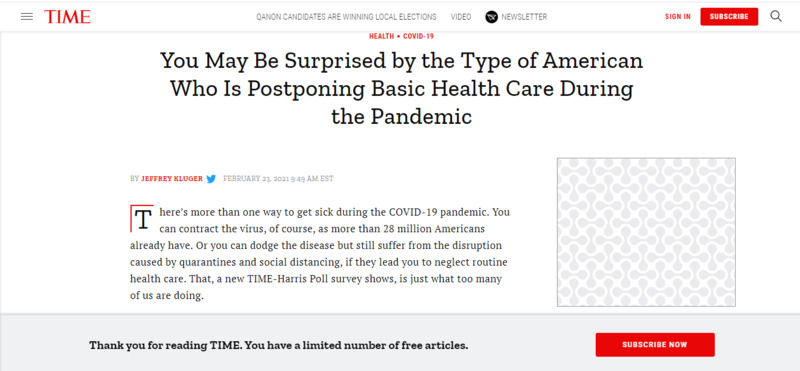 2021-04-11
2021-04-11Postponing Basic Health Care During the Pandemic
I have been researching the unintended consequences of the COVID-19 pandemic. One consequence that interests me the most is people missing important specialist appointments for things like heart disease or cancer. I would have assumed that it would be the lower class skipping these appointments the most due to the fact that is many cases it is already harder for lower class people to get to regular appointments. But this article proves my thought wrong, and states that the lower and middle class people have less opportunity to miss these appointments. They tend to have more healthcare problems, according to the article, and therefore need the appointments more. In addition, the numbers might reflect the fact that lower income people don't go to the doctor as much as higher income people in general, therefore the numbers were low to begin with. The article is a very interesting read and I highly suggest it. -
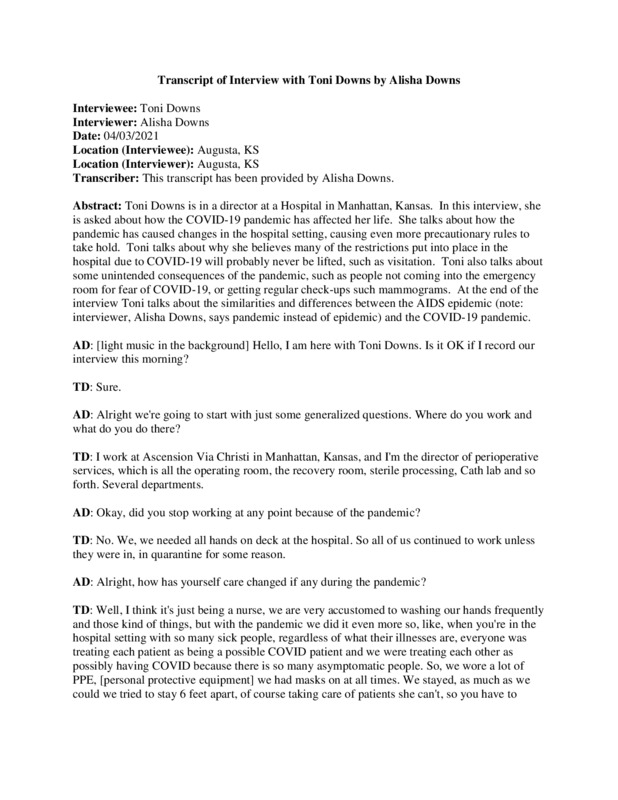 2021-04-03
2021-04-03Oral Interview with Toni Downs
Toni Downs is in a lead position at a hospital in Kansas. In this interview, Toni tells me about changes that have occurred at the hospital as a result of the COVID-19 pandemic. She also discusses the long term changes she suspects will stay in effect, such as visitation regulations to the hospital. Toni tells me about similarities and differences between this pandemic and the start of the AIDS pandemic. She also discusses how the number of people going to the emergency room have dropped significantly, more than 75% at the start of the pandemic. Toni believes if we all work together at stopping the spread, we will get this under control. However, she thinks many things may stay around for a while in the hospital setting, such as the before mentioned visitation rules, and even mask wearing, in order to protect hospital staff and the patients. I am researching the unexpected consequences of the COVID-19 pandemic, such as people skipping mammograms for fear of catching COVID at the doctors office. I chose to interview Toni for my research, due to her insider knowledge of the inner workings of a hospital. -
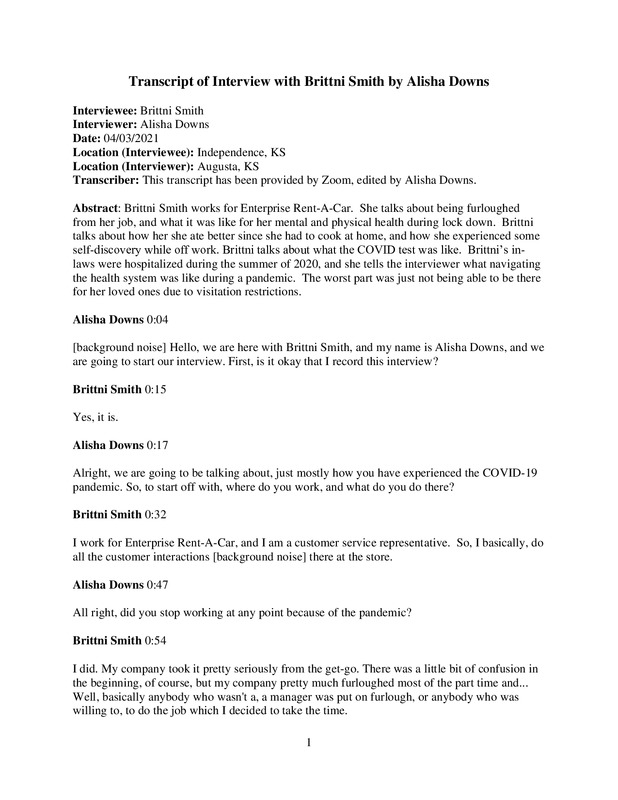 04/03/2021
04/03/2021Brittni Smith Oral History, 2021/04/03
Brittni Smith lives in a small town in Kansas. Here, I interview her about her experiences during the COVID-19 pandemic. She talks about what it was like getting a COVID test. Brittni also tells me about what it was like to have family hospitalized during a pandemic. Her work furloughed her for a few months at the beginning of the pandemic, which she also tells me about. I am researching the unexpected consequences of the pandemic; a good example would be people not going to the doctor for checkups for fear of catching COVID. I interviewed Brittni for this research. -
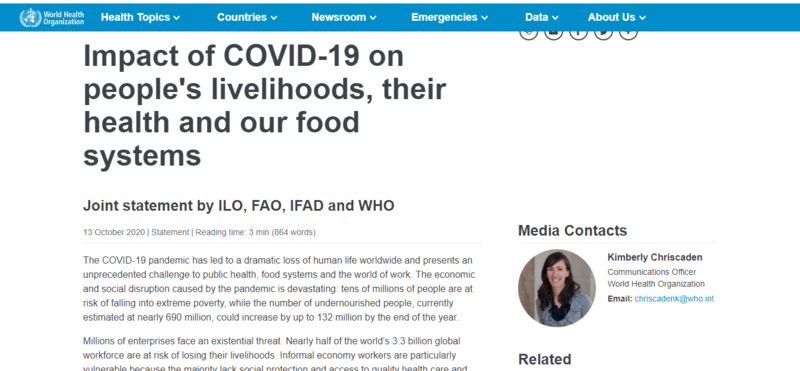 2021-04-04
2021-04-04COVID Impacts
This article by the World Health Organization (WHO) talks about the effects of the COVID-19 pandemic on people’s livelihoods. The article says “tens of millions of people are at risk of falling into extreme poverty.” As a human living in a two story house that is food secure, this may just seem like a number. But extreme poverty is a human rights violation, and it is already clear the pandemic’s ripples are affecting people in serious ways. Further in the article, it starts to talk about the effects on the food and trade industry, which includes issues with closed borders, farmers being able to sell their food, and even people accessing healthy foods. The article ends by acknowledging the opportunity we have to rebuild a better world, and I find comfort in this thought. -
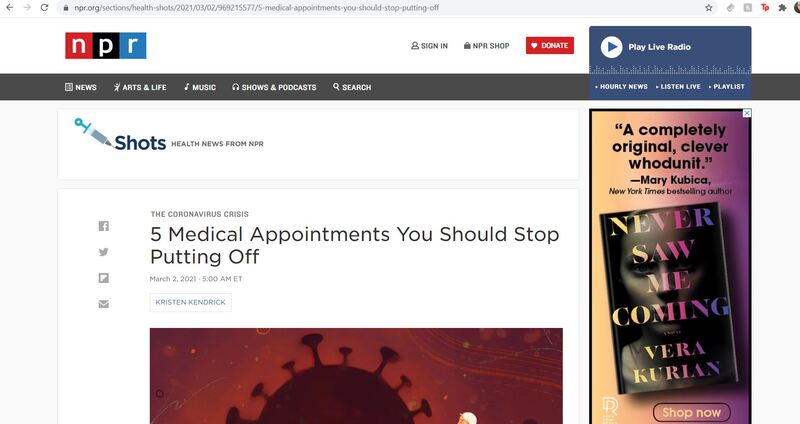 2021-04-04
2021-04-04Putting off Medical Appointments for fear of COVID
I myself did not see a doctor or make any appointments until August of 2020, roughly 5 months into the pandemic. I attended my well woman’s exam, something I get yearly. The article I have added here was written by a doctor. He talks about in the beginning of the pandemic, it was critical to only see the patients that needed to be seen, as there was still so much unknown. He goes on to talk about how the risks from postponing exams outweigh the risk of catching COVID-19. This is a big part of my research, the unintended consequences of the COVID-19 pandemic. "A woman is more likely to die from an advanced-stage breast cancer than she is from COVID-19," said Therese Bevers, a medical director at a MD Anderson Cancer Center. The doctor who wrote the article said he consulted with other doctors to create a list of appointments you should stop putting off. These are: cancer screenings, checkups for “new red-flag symptoms,” follow ups for chronic diseases, mental health management, and sexual health management. It is clear that these issues are important for human health upkeep, and they shouldn’t be avoided due to COVID-19 anymore. We have yet to see just how many health issues have been ignored during this pandemic. -
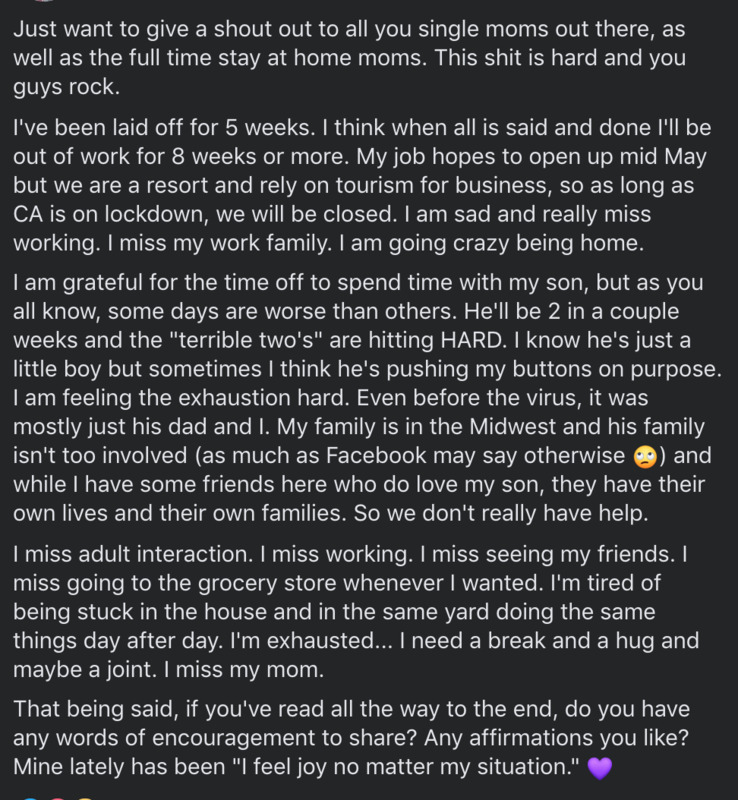 2021-03-28
2021-03-28Motherhood during a pandemic
I am researching the unintended consequences of the pandemic. One way to find some answers is to learn what real people are going through. It is easy to find people’s thoughts about the pandemic on social media, so I took to my mom groups and found people willing to let me share their thoughts anonymously. In the first screenshot, a mom talks about how she is trying to stay positive through the pandemic. From losing her job temporarily, to missing her work and family, to missing simple everyday things like shopping, this mom is feeling the brunt of lockdown in California. It is easy to pick out the negative consequences of the pandemic, but she looks for positivity anyway. The next mom is worried about how her child is going to come out on top due to homeschooling. She wants advice on how to keep her son motivated and not give up when things get hard. There is no way to tell exactly how this pandemic has affected our kids, only time will tell. But there have definitely been some unintended consequences. This example shows that while we are parents and we love our children, we have no idea what the teachers were doing to help our kids through each class before the pandemic. Perhaps one consequence of the pandemic will be a larger respect for teachers. I plan to further use social media for my research, along with academic studies, and oral interviews. -
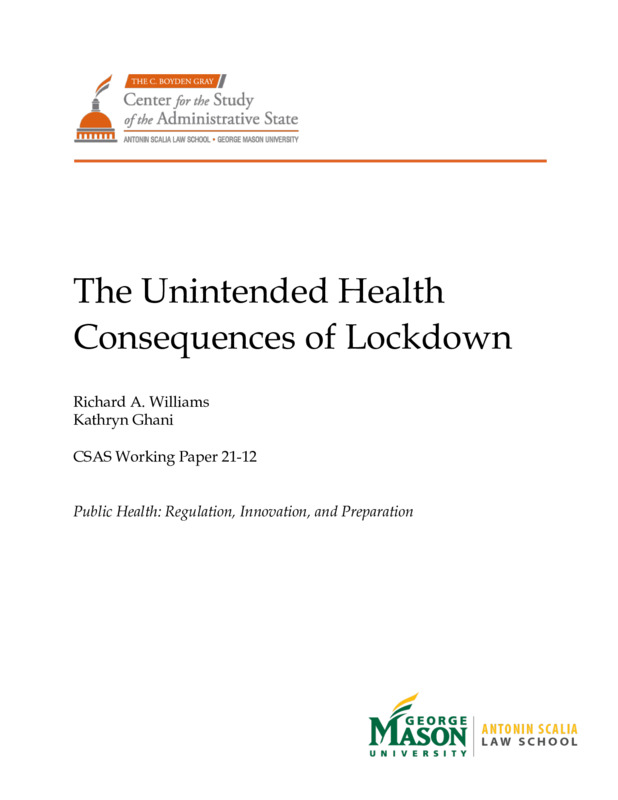 2021-03-28
2021-03-28Unintended Consequences of Lockdown
I am researching the unintended consequences of the COVID-19 pandemic. This article is an in-dept look on the consequences of lockdown in the US. While the article covers positive consequences like less pollution and less contagious diseases like the flu, I am going to talk about some of the ones related to my research. The article says most “unintended consequences fall generally into five categories: lack of care, isolation, wealth/health loss, psychological harm, and harm to children.” Lack of care includes people who do not feel comfortable going to the doctor or hospital for fear of catching COVID-19. The amount of people who went in for a severe heart attack has dropped by 40%. Isolation consequences include things like an increased rate of suicidal thoughts and an increase in drug overdoses. Wealth and health loss is due to loss of income, and as evidence shows, poverty is deadly. Psychological harm involves burnouts and stress related breakdowns, as well as mental health disorders and insomnia. The harm to children section includes many heartbreaking statistics about lack of school based mental health care, sexual abuse, drug use, and neglect. The article talks about how the effects of all of this may not be known for many years, but it is clear there have been many negative consequences of lockdowns due to the pandemic. -
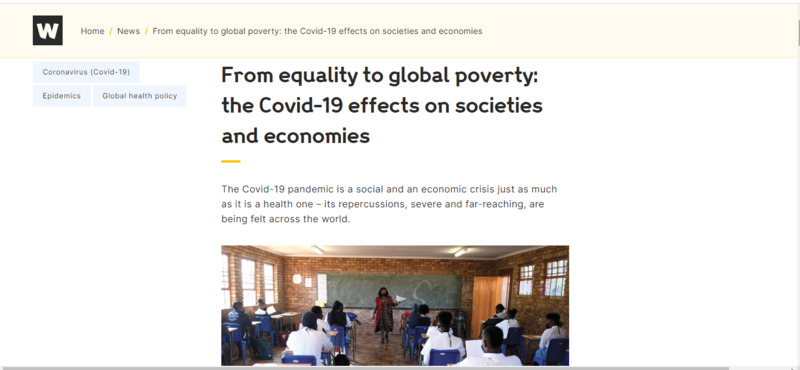 2020-09-22
2020-09-22Unintended Consequences Part II
This article, "From Equality to Global Poverty: How Covid-19 is Affecting Societies and Economies," includes much information. It covers things like the fact that millions of kids may not ever go back to school after this. The article talks about how poverty has increased since the outbreak and how clean energy progress has stalled. The article ends by talking about the investments needed. But all in all there is a lot of important information here on unintended consequences. -
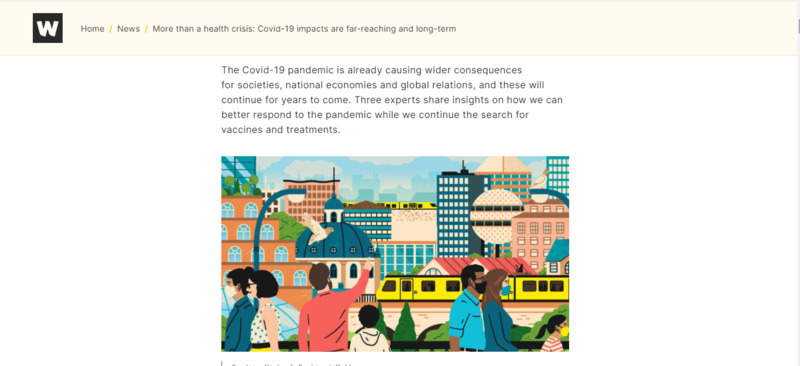 2020-08-26
2020-08-26Unintended Consequences
Devi Sridhar from the London School of Economics covers some things we don't think about when we think about consequences of the pandemic. She compares outbreaks to black holes, as society focuses attention to the pandemic, other priorities are put to the side. Juliet Bedford talks about the vulnerabilities of poorer communities. This interview covers lots of unintended consequences and outcomes of the pandemic. -
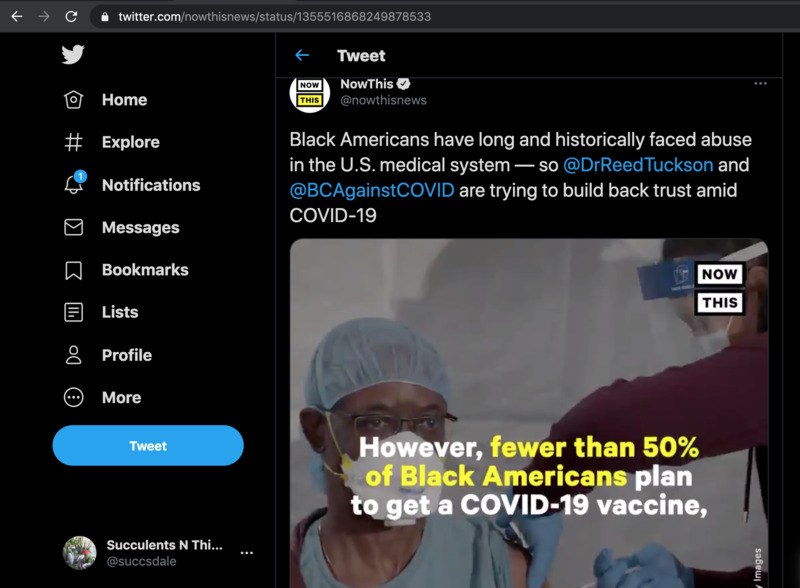 2021-02-28
2021-02-28Building Trust in the Vaccine
When I was pregnant and going to birthing classes, I learned the terrifying rates of mortality for Black women giving birth. The numbers were horrifying, so there is no wonder to me why a high percentage of Black Americans do not plan on getting the COVID-19 vaccine. The American healthcare system has failed them. But a group of Black doctors are standing up to tell their communities that not taking the vaccine is to risk their life, and they deserve better. This video, shared to NowThisNews on twitter, describes what the doctors' message is and why it is so important. Black lives do matter, which is why these doctors are urging everyone to get the vaccine. The video states that more Black Americans have died from COVID than any other ethnic group. Hopefully, the vaccine will stop these deaths. -
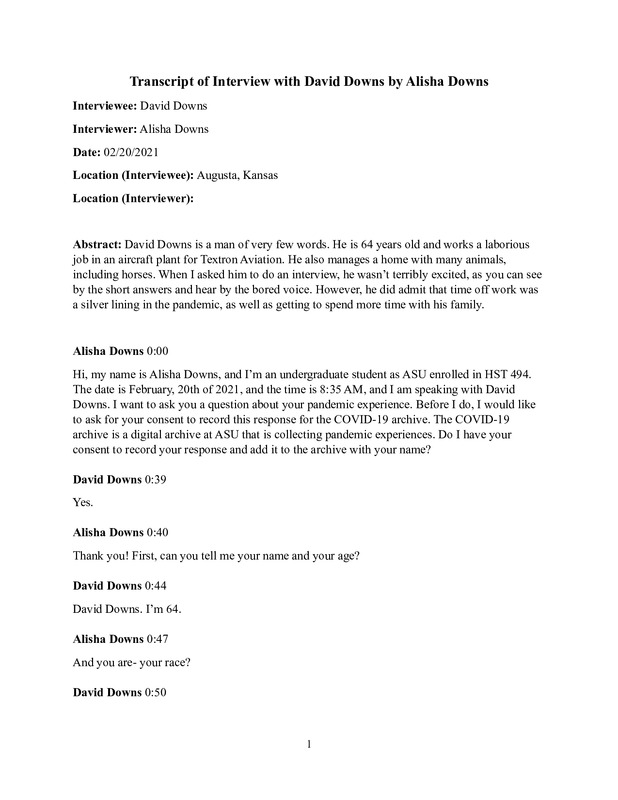 02/20/2021
02/20/2021David Downs Oral History, 2021/02/20
David Downs is a man of very few words. He is 64 years old and works a laborious job in an aircraft plant for Textron Aviation. He also manages a home with many animals, including horses. When I asked him to do an interview, he wasn’t terribly excited, as you can see by the short answers and hear by the bored voice. However, he did admit that time off work was a silver lining in the pandemic, as well as getting to spend more time with his family. -
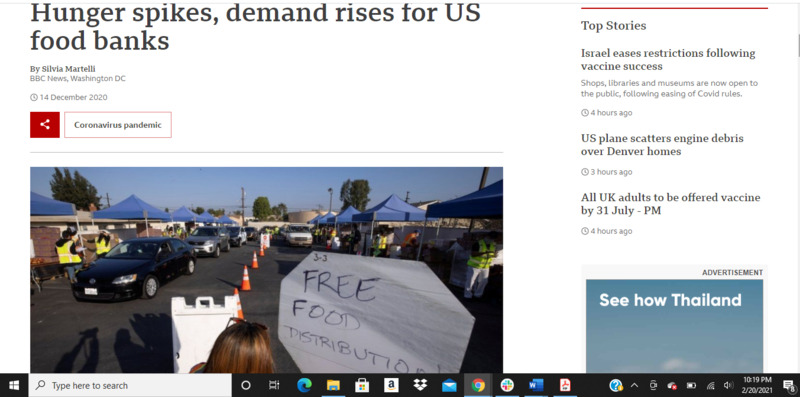 2021-02-07
2021-02-07Hungry in a Pandemic - Food Banks
The numbers of people with food insecurities in 2020 include some scary statistics. The BBC wrote that one in eight Americans didn’t have enough food in the month of November, 2020. Feeding America said one in every six Americans would face food insecurity. Some people are getting creative, like a food bank in Illinois that started out online, providing a sort of online grocery shopping, but for free. Hunger has been a world-wide problem for a long time, and is something I would like to see ended in my life time. However, during this pandemic, when many more people began facing economic hardships, we see different outcomes. Some people are trying to make changes and help more vulnerable people, like some of the stories you can find on foodbanknews.org. Unfortunately, there are still many people facing the fact that they do not know when their next meal will come from. It isn’t a food problem, it is a society problem. -
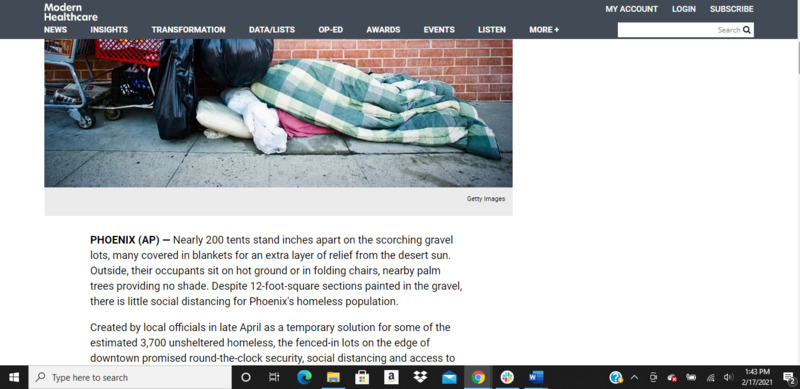 2021-02-07
2021-02-07Homelessness During a Pandemic
A population that gets put last for many things is not going to be completely last for the COVID vaccine. Each individual US state is in charge of the vaccine distribution, but some states, like Connecticut for example, have homeless shelters and similar places under the “congregate settings” part of the vaccine rollout, typically in the first few phases. The homeless population is far too high in the US, and during the COVID pandemic, not much more than the bare minimum has been done. The CDC and many other health organizations have the homeless and other vulnerable populations written into the big picture, with guides and recourses for cities and governments. However, these vulnerable populations are high risk during this pandemic. Food banks have seen a major rise in 2020 as more people are facing economic hardships. Attached are a few related articles. While there are some people working tirelessly to improve the homeless situation in the US, more needs to be done. The articles give a glimpse into the various aspects of the homeless crisis in America, and how we are trying to help during the pandemic, but simultaneously not doing enough. -
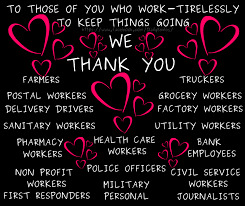 2021-02-07
2021-02-07To Mask or not to Mask
Perhaps, it is an American phenomenon. People refusing to wear masks in public places, even when face to face with an “essential worker.” At the start of the pandemic in the United States, when people were closing their doors and staying home, there became a flurry of conversations about essential workers, the people who couldn’t stay home, in order to keep society as we know it flowing. Hospital workers, fighting the unknown; the service industry, continuing to feed and care for people; factory workers and truckers, delivering the stuff people staying home needed, all essential. Unfortunately, there is an ongoing battle that effects everyone: people refusing to wear masks. Some in the medical industry, especially the ones helping COVID patients fight for their life, feel like it is a slap in the face. People in the service industry have to decide between asking somebody to put on a mask and risking being verbally or physically attacked by the person, or risking their own health. I have added a few sources. First, some memes and pictures, thanking essential workers. There is an article from Forbes on how to deal with customers who will not wear a mask. I’ve added a BBC article on why Americans don’t wear masks, but also an article from The Indian Express that shows anti-mask protests in multiple countries. Masks are a pretty simple addition to our lives. Of course, they take a while to get used to, and still leave me sweaty. While they are not a solution for completely stopping the spread of COVID, they do make a difference, and should be taken seriously. The sources I’ve attached tell a small part of the story of how humans have reacted to this pandemic. -
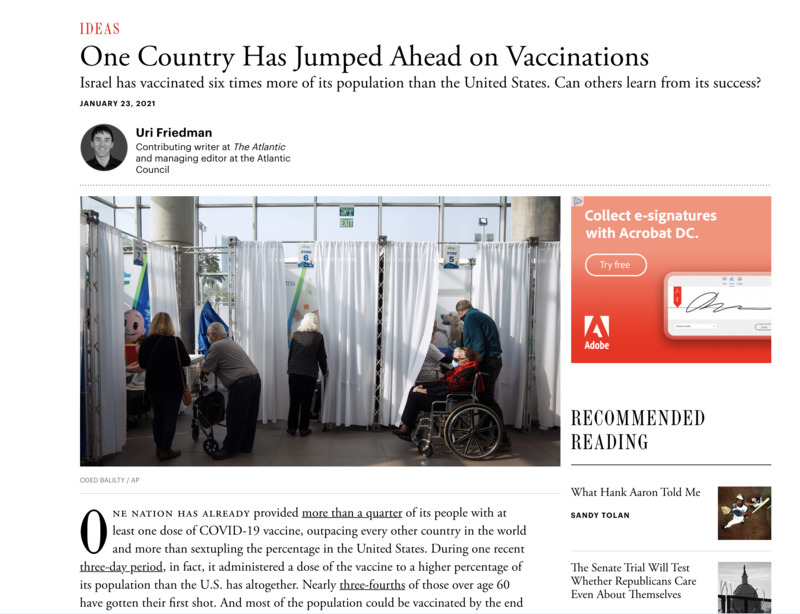 2021-01-24
2021-01-24Israel - The Leader in Vaccine Rollout
Israel is leading the vaccine rollout by a decent margin, with the United Arab Emirates close behind. Indeed, Israel hopes to have most of the population vaccinated by March. The advances in the vaccine rollout in these countries are an excellent chance to review the success rates in a larger population pool. There are many reasons for the success of Israel's rollout, including advance planning, an efficient healthcare system, and methodical shipping, storage, and distribution. -
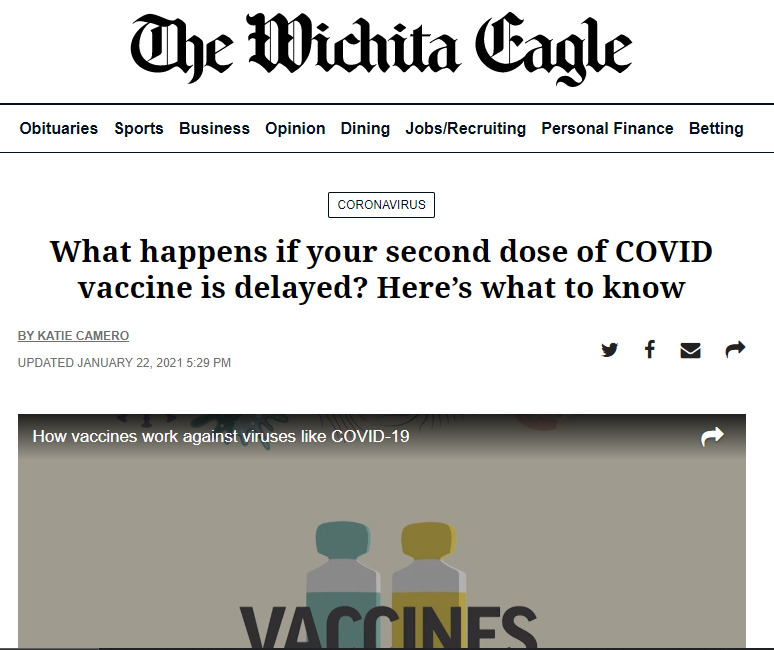 2021-01-18
2021-01-18Second Dose Issues
In Wichita, Kansas, they gave all the doses they had with assurances that the second doses will arrive soon. However, as the date creeps up, the clinics haven’t received the second shipment later, and people are left wondering if they'll even be able to receive the second dose in the correct window of time. -
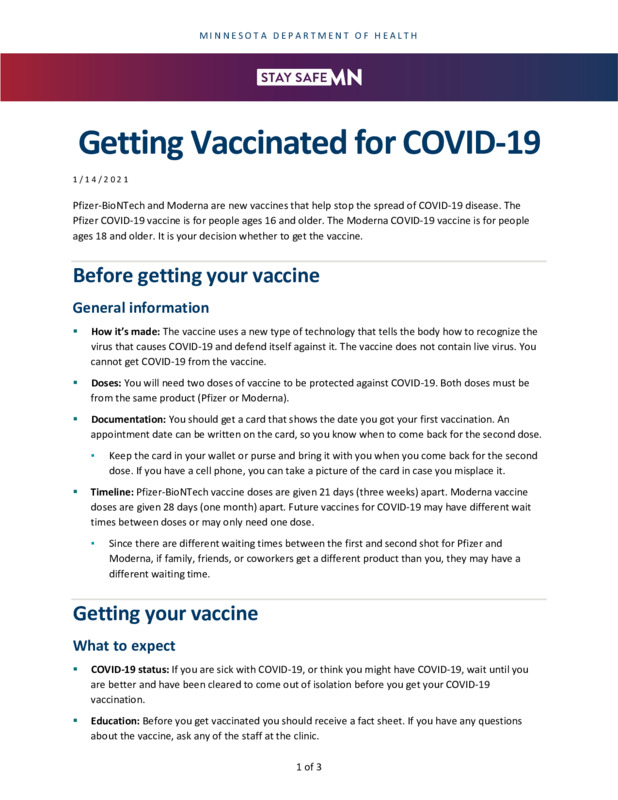 2021-01-20
2021-01-20Vaccine and the Community
Somebody who doesn’t work in the medical field might view this as a not so complicated process. But somebody planning how to distribute the vaccine to everyone in the community sees many challenges. Both Moderna and Pfizer vaccines require a second dose in a specific time period. One challenge presents itself with the homeless population, how to get them back for their second dose and within the required time period. Suggestions for solving this problem include giving free transportation and meals for the people receiving their vaccine, but there seems to be no easy answer. Some experts are trying to find a solution by educating and informing the public, hoping to ease fear and get people in for both doses. -
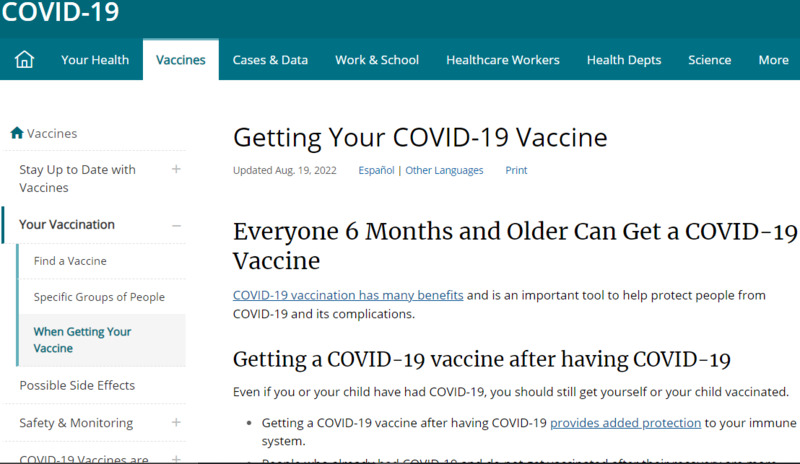 2021-01-23
2021-01-23Giving the Vaccine
The process of giving the COVID vaccine is not as simple as one may think. For starters, hospitals and clinics have no idea when they will receive the next shipment of doses since it is held and distributed by the state. Scheduling appointments for the general population is difficult without knowing when they’ll receive the next shipment. Then, the paperwork is extensive for each patient. And when a bottle is opened, all doses must be pulled up immediately and distributed within 15-45 minutes, leaving little room for mistakes or missed appointments. Via Christi in Manhattan, Kansas, USA is proud to say they have not wasted a single dose yet, unlike many other hospitals across the US. The patient then has to wait for 15 minutes to be observed by the hospital staff for reactions before they can leave. If this sounds like a lot for a patient, imagine the process for the hospital staff. -
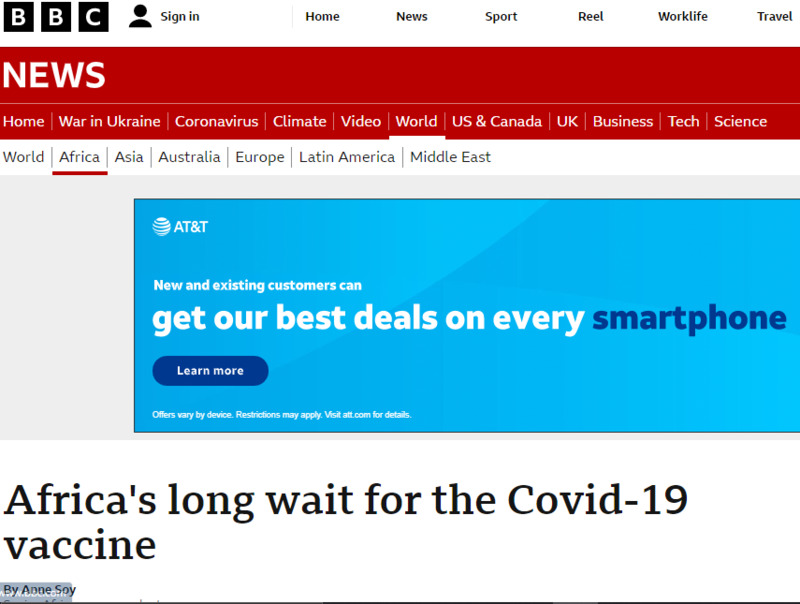 2021-01-23
2021-01-23Vaccine Rollout in Lower-Middle Income Countries
Getting vaccines for lower to middle income countries is a challenge. Some experts believe up to 90% in low income countries will not receive the vaccine in 2021. It isn’t just buying the vaccine for them, it is transporting the vaccine safely. The vaccine is incredibly temperature-sensitive. The Moderna vaccine must be kept between -25°C and -15°C (-13°F and 5°F), while the Pfizer vaccine is minus 70°C! The answer for rural areas: solar-powered refrigeration. This “cold chain” of refrigerated vehicles may allow many areas in places like Africa to receive the vaccine. There are still complications and experts think up to 25% of the vaccines will still be wasted until the refrigerators are perfected. -
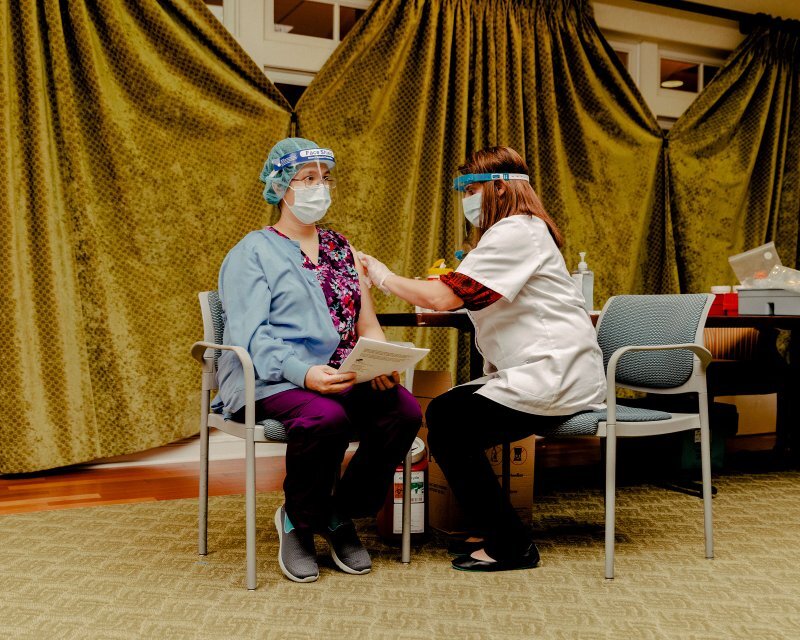 2021-01-22
2021-01-22Vaccine Rollout Complications
People want the vaccine, and they want it now, but the process of clinics and hospitals giving the vaccine is a major process. To start, the vial must be pulled up all at once, and all five doses have to be given within a short time period, or they are ruined. Another complicated problem is the social distancing guidelines. Doctor’s offices are not generally large offices, and patients have to be there for at least fifteen minutes for observation, making drive thru vaccinations improbable. In addition, planning a day to give out vaccines is hard to do in advance, because medical centers have no idea when they will receive the vaccine. The state has control, and currently there seems to be insufficient communication and organization in many states. -
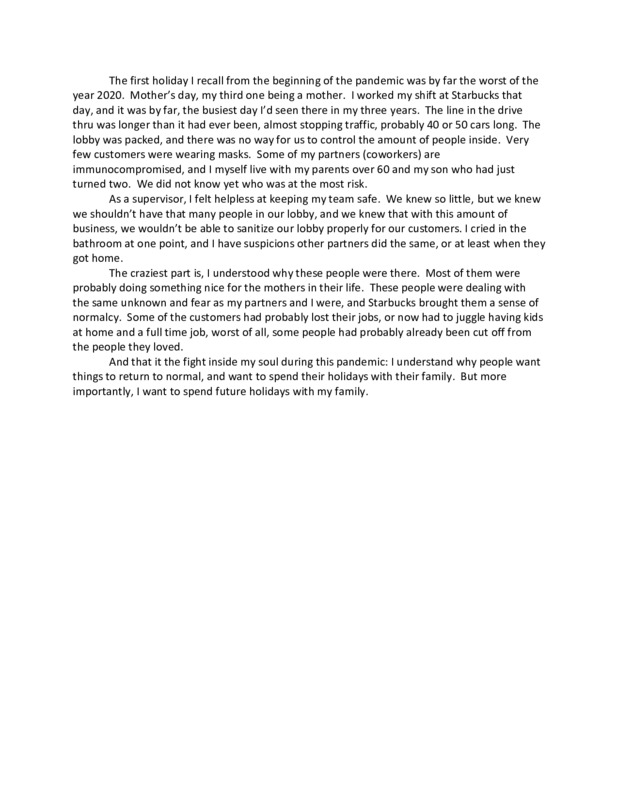 2021-01-11
2021-01-11My Pandemic Holidays
Holidays were really hard for a lot of people. While I don't feel like mine were effected too much, I think my story is still worth sharing! -
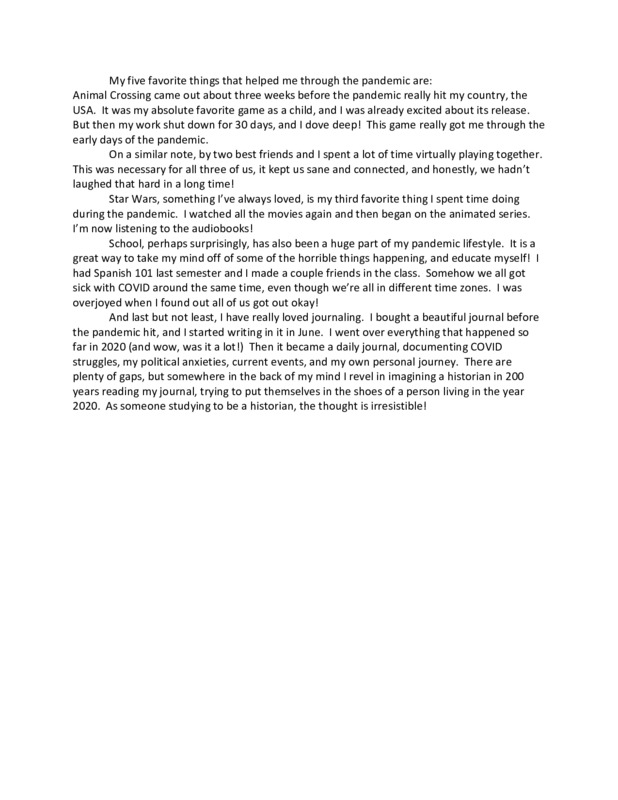 2021-01-13
2021-01-13My Pandemic Pastimes
It is important to understand how our society has dealt with this pandemic, and my entry covers what I enjoyed during the pandemic. Things that got me through and kept me sane!
